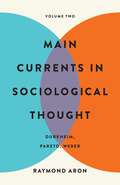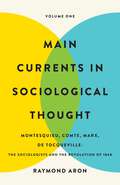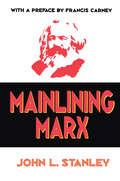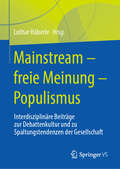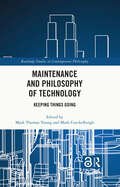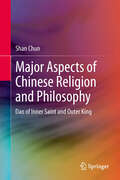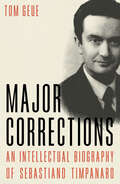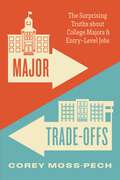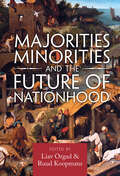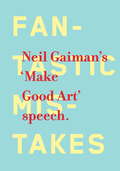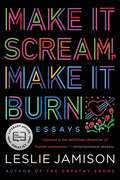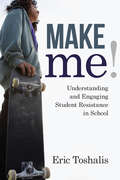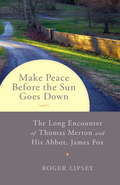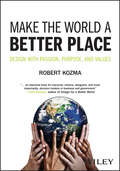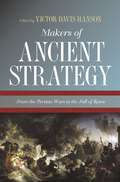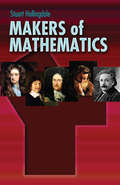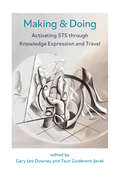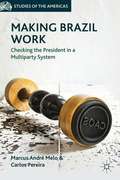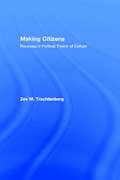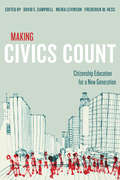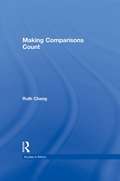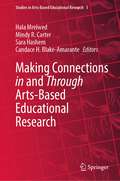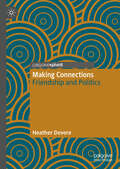- Table View
- List View
Main Currents in Sociological Thought: Durkheim, Pareto, Weber
by Raymond AronThe second volume of the landmark study, examining the work of sociology&’s defining thinkers from the turn of the nineteenth century to the interwar periodMain Currents in Sociological Thought remains a foundational synthesis in the field. In this second and final volume of his classic survey, Raymond Aron explores the work of three figures who profoundly shaped sociology as it entered the twentieth century: Durkheim, who continued Comte&’s quest for a science of society and a scientific validation of morality; Pareto, the Italian &“neo-Machiavellian&” who emphasized the elitist character of all societies; and Weber, the German sociologist who reflected critically on the prospects for human freedom in an age of disenchantment. Bringing together penetrating intellectual portraits of these great thinkers and close readings of their most consequential texts, Main Currents in Sociological Thought highlights the historical and intellectual context within which each man wrote and draws out their works&’ enduring insights and influence in the field today.
Main Currents in Sociological Thought: Montesquieu, Comte, Marx, De Tocqueville: The Sociologists and the Revolution of 1848
by Raymond AronThe first volume of the landmark study, tracing the emergence and formation of sociological thought from the French liberal school to the Marxists Main Currents in Sociological Thought remains a foundational synthesis in the field. In this first part of his magisterial two-volume survey, Raymond Aron embraces an expansive definition of sociology that merges empirical inquiry with historical and social analysis. At its core, Aron&’s work is an engagement with the very question of modernity: How did the intellectual currents that emerged in the eighteenth century shape the modern political and philosophical order? With scrupulous fairness, Aron examines the thoughts and arguments of the discipline&’s major social thinkers to discern how they answered this question. Volume 1 explores three traditions: the French liberal school of political sociology, represented by Montesquieu and Tocqueville; the Comtean tradition, anticipating Durkheim in its elevation of social unity and consensus; and the Marxists, who posited the struggle between classes and placed their faith in historical necessity. Written with his customary lucid elegance of thought and style, Aron&’s work is essential reading for students across the social sciences.
Mainlining Marx
by John L. StanleyIn recent years a host of Western Marxists have tried to emancipate Marx from responsibility for various unsavory doctrines. Political theorists have argued that Marx can avoid the weight of Stalinism and also the various theories, such as positivism, naturalism, Darwinism, technological determinism and the dialectics of nature that support Marxism. In the course of building up their defense of Marx, these modern critics have developed an elaborate but often confusing rationale whose premise consists of attributing many of the nefarious tendencies of Marxism to Engels, particularly the latter's philosophy of nature. In Mainlining Marx, John L. Stanley sets Marx's view of nature back in its proper perspective.Stanley challenges the "new orthodoxy" of prominent Marxist scholars who see a fundamental dichotomy between Marx and Engels with the latter believing in cosmic superlaws and the former adhering to historically grounded ones. Stanley argues both Marx and Engels used historical and transhistorical laws at various times. He is highly critical of those who abstract theoretical principles out of texts Marx wrote with specific and historical political goals in mind. He takes issue, as well, with critics who posit a Marxian belief in communist as against natural needs, and further challenges the new orthodoxy in his analysis of Marx's dissertation, showing that from the beginning Marx's thought was grounded in materialist determinism.Supplementing the chapters on Marx and his critics, the volume concludes with an essay on Georges Sorel's approach to textual analysis and interpretation, showing how Sorel, far in advance of his time realized the impossibility of completely objective analysis and the inevitable distortion of the subject under study.Throughout this volume, Stanley's critical approach utilizes Sorel's illuminating insights to point out the distortions in modern Marxian analysis. Challenging and original, Mainlining Marx is a major contribution to the study of Marxism. It will be read by economists, political scientists, and intellectual historians.
Mainstream – freie Meinung – Populismus: Interdisziplinäre Beiträge zur Debattenkultur und zu Spaltungstendenzen der Gesellschaft
by Lothar HäberleDer Mainstream, prinzipiell wandelbar, ist seit einigen Jahren geprägt von erheblicher Enge (d.h. Diskurs-Ächtung einiger Teile der Gesellschaft). Meinungsfreiheit implodiert, besonders durch Ausgrenzungen Privater. Zudem radikalisieren sich kleinere Gruppen, wozu das Internet viel beiträgt. Im Populismus – von rechts wie von links – haben gesellschaftliche Spaltungstendenzen dann schon deutliche Prägung erfahren. Die Frage, wann und ob das Phänomen einer im engeren Sinne „gespaltenen Gesellschaft“ vorliegt, wird hier kaum direkt behandelt, die acht Buchbeiträge jedoch stehen in vielfältiger Beziehung hierzu. Gesellschaftlichen Spaltungstendenzen kann entgegnet werden: u.a. durch Beachtung einiger Diskurs-Grundsätze, auch im Online-Bereich.
Maintenance and Philosophy of Technology: Keeping Things Going (Routledge Studies in Contemporary Philosophy)
by Mark Coeckelbergh Mark Thomas YoungWhat can we learn about the nature of technology by studying practices of maintenance and repair? This volume addresses this question by bringing together scholarship from philosophers of technology working at the forefront of this emerging and exciting topic.The chapters in this volume explore how attending to maintenance and repair can challenge and complement existing ways of thinking about technology focused on use and design and introduce new philosophical perspectives on the relationship between technology, time and human practice. They examine the significance of maintenance and repair practices at different scales in relation to a diverse range of philosophical traditions and a wide variety of technologies, from urban infrastructure such as bridges and buildings to data technologies such as servers and software systems. Together, the contributions highlight common themes in the philosophical study of maintenance, including the role of skill, the significance of social values and the potential of these practices to transform the technologies to which they are applied. By reflecting on the different ways in which we keep technologies going, from the devices we use in our homes to the large technical systems which surround us, this volume reveals the philosophical significance of practices of maintenance, not only as a source of new insights but also as a resource for enriching our understanding of a variety of existing topics in philosophy.Maintenance and Philosophy of Technology will appeal to scholars and advanced students working in philosophy of technology, philosophy of engineering and science & technology studies.Chapter 9 of this book is freely available as a downloadable Open Access PDF at www.taylorfrancis.com under a Creative Commons Attribution-Non Commercial-No Derivatives (CC-BY-NC-ND) 4.0 license.
Major Aspects of Chinese Religion and Philosophy
by Chun ShanThe book addresses academically the major aspects of Chinese religion and philosophy, designated as the doctrine of being internal sage and external king. The perspective applied is the integration between western and Chinese scholarship and English readers may gain an easy and interesting access to Chinese intellectual tradition, distinctive itself in a harmony between being holy and secular in any mundane human being to the western tradition of "Give to Caesar what is Caesar's, and to God what is God's". By this contrast the intellectual charms and spiritual merits of Chinese tradition will be better appreciated, hence conducive to the much anticipated dialogues between western and eastern civilizations at this globalized yet conflicted world.
Major Corrections: An Intellectual Biography of Sebastiano Timpanaro
by Tom GeueA trenchant analysis of the thought of Sebastiano Timpanaro, one of the most original leftist thinkers of the 20th centurySebastiano Timpanaro (1923-2000) was one of the most original leftist thinkers of the 20th century. His thought spans a unique range of subjects, from materialism to classical philology, from the Enlightenment to Freud, from science to socialism, from the history of linguistics to 19th century Italian literature.Timpanaro confronted this manifold material with addictive clarity and incisive honesty. This book is the first serious attempt in any language to introduce Timpanaro&’s thought in its entirety.Drawing on original archival research, Geue shows the astonishing breadth of Timpanaro&’s intellect and his eccentric dual profile as a Marxist and technical philologist. From this emerges not only a compelling portrait of a neglected radical thinker, but also a rallying call for the Left to revive its commitment to scientific truth and rigorous detail.
Major Trade-Offs: The Surprising Truths about College Majors and Entry-Level Jobs
by Corey Moss-PechAn eye-opening look at the relationship between students’ majors and their entry-level jobs. Humanities majors are used to answering the question, “So, what are you going to do with that degree?” The common misconception is that students in humanities programs don’t learn any useful skills for the real world. In Major Trade-Offs, sociologist Corey Moss-Pech argues that not only do humanities majors learn real-world skills, but they actually use them when they graduate. Despite this discrepancy, graduates with so-called practical degrees like business and engineering are much more likely to find employment, and they earn higher salaries. Why do we belittle a liberal arts education despite the valuable skills that students acquire during their studies? Major Trade-Offs addresses this question by following students from different majors as they enter the workforce. To understand the relationship between majors and entry-level jobs, Moss-Pech conducted nearly 200 interviews with roughly ninety students from four majors at a large Midwestern university: engineering, business, English, and communications. He follows these students through their senior years, chronicling their internships and the support their universities provide in helping them pursue their career paths. He found that graduates from practical majors entered the labor market successfully, typically through structured internship programs. However, many ended up in entry-level jobs that, while well-paid, were largely clerical and didn’t necessarily require a degree to perform. On the other hand, liberal arts majors rarely accessed structured internships and were largely left to carve out their own paths, but did use their degree skills once they secured a job. These results challenge popular myths about the “marketability” of these different majors and offer a new vision for the future of higher education. Liberal arts skills are essential in the labor market, and yet educators and policymakers still push resources into the practical arts, perpetuating the myth that those majors are more valuable while depriving students of a well-rounded education and leaving them no better prepared for the workforce than liberal arts students. Of interest to students, educators, and employers, Major Trade-Offs calls on colleges and universities to advocate for liberal arts majors, leveling the playing field for students as they plan for entry-level work.
Majorities, Minorities, and the Future of Nationhood
by Ruud Koopmans Liav OrgadThe design of democratic institutions includes a variety of barriers to protect against the tyranny of the majority, including international human rights, cultural minority rights, and multiculturalism. In the twenty-first century, majorities have re-asserted themselves, sometimes reasonably, referring to social cohesion and national identity, at other times in the form of populist movements challenging core foundations of liberal democracy. This volume intervenes in this debate by examining the legitimacy of conflicting majority and minority claims. Are majorities a legal concept, holding rights and subject to limitations? How can we define a sense of nationhood that brings groups together rather than tears them apart? In this volume, world-leading experts are brought together for the first time to debate the rights of both majorities and minorities. The outcome is a fascinating exchange on one of the greatest challenges facing liberal democracies today.
Make Good Art
by Neil GaimanFrom the bestselling author of the acclaimed novel AMERICAN GODS and the prize-winning THE OCEAN AT THE END OF THE LANE.In May 2012, Neil Gaiman delivered the commencement address at Philadelphia's University of the Arts, in which he shared his thoughts about creativity, bravery, and strength. He encouraged the fledgling painters, musicians, writers, and dreamers to break rules and think outside the box. Most of all, he urged them to make good art.The book MAKE GOOD ART, designed by renowned graphic artist Chip Kidd, contains the full text of Gaiman's inspiring speech.Praise for Neil Gaiman:'A very fine and imaginative writer' The Sunday Times'Exhilarating and terrifying' Independent'Urbane and sophisticated' Time Out'A jaw-droppingly good, scary epic positively drenched in metaphors and symbols... As Gaiman is to literature, so Antoni Gaudi was to architecture' Midweek'Neil Gaiman is a very good writer indeed' Daily Telegraph
Make It Scream, Make It Burn: Essays
by Leslie JamisonFrom the "astounding" (Entertainment Weekly), "spectacularly evocative" (The Atlantic), and "brilliant" (Los Angeles Times) author of the New York Times bestsellers The Recovering and The Empathy Exams comes a return to the essay form in this expansive new book. <P><P>ONE OF THE FALL'S MOST ANTICIPATED BOOKS: Time, Entertainment Weekly, O, Oprah Magazine, Boston Globe, Newsweek, Esquire, Seattle Times, Baltimore Sun, BuzzFeed, BookPage, The Millions, Marie Claire, Good Housekeeping, Minneapolis Star Tribune, Lit Hub, Women's Day, AV Club, Nylon, Bustle, Goop, Goodreads, Book Riot, Yahoo! Lifestyle, Pacific Standard, The Week, and Romper. <P><P>With the virtuosic synthesis of memoir, criticism, and journalism for which Leslie Jamison has been so widely acclaimed, the fourteen essays in Make It Scream, Make It Burn explore the oceanic depths of longing and the reverberations of obsession. <P><P>Among Jamison's subjects are 52 Blue, deemed "the loneliest whale in the world"; the eerie past-life memories of children; the devoted citizens of an online world called Second Life; the haunted landscape of the Sri Lankan Civil War; and an entire museum dedicated to the relics of broken relationships. <P><P>Jamison follows these examinations to more personal reckonings -- with elusive men and ruptured romances, with marriage and maternity -- in essays about eloping in Las Vegas, becoming a stepmother, and giving birth. <P><P>Often compared to Joan Didion and Susan Sontag, and widely considered one of the defining voices of her generation, Jamison interrogates her own life with the same nuance and rigor she brings to her subjects. The result is a provocative reminder of the joy and sustenance that can be found in the unlikeliest of circumstances.
Make Me!: Understanding and Engaging Student Resistance in School
by Eric ToshalisIn this groundbreaking book, Eric Toshalis explores student resistance through a variety of perspectives, arguing that oppositional behaviors can be not only instructive but productive. All too often treated as a matter of compliance, student resistance can also be understood as a form of engagement, as young people confront and negotiate new identities in the classroom environment. The focus of teachers' efforts, Toshalis says, should not be about "managing" adolescents but about learning how to read their behavior and respond to it in developmentally productive, culturally responsive, and democratically enriching ways. Noting that the research literature is scattered across fields, Toshalis draws on four domains of inquiry: theoretical, psychological, political, and pedagogical. The result is a resource that can help teachers address this pervasive classroom challenge in ways that enhance student agency, motivation, engagement, and academic achievement. The coauthor of Understanding Youth: Adolescent Development for Educators (Harvard Education Press, 2006), Toshalis blends accessible explanations of theory and research with vignettes of interactions among educators and students. In Make Me!, Toshalis helps teachers perceive possibility, rather than pathology, in student resistance. "With poignance and skill, Toshalis shepherds educators away from yearning for prescriptive classroom management heuristics to spaces where they embrace the 'remaking' of themselves in their journey to serve, build, and respond to the humanity of students.Make Me! is a pre-service and in-service teacher education gem that will surely improve the way classroom management is taught, understood, operationalized, and practiced." --H. Richard Milner IV, Helen Faison Endowed Chair of Urban Education, University of Pittsburgh
Make Peace before the Sun Goes Down: The Long Encounter of Thomas Merton and His Abbot, James Fox
by Roger LipseyIn the 1950s and '60s, Thomas Merton, a monk of the Trappist monastery of Gethsemani in Kentucky, published a string of books that are among the most influential spiritual books of the twentieth century--including the mega-best seller The Seven-Storey Mountain. He was something of a rock star for a cloistered monk, and from his monastic cell he enjoyed a wide and lively correspondence with people from the worlds of religion, literature, and politics. During that period he also explored and wrote extensively on Buddhism, Sufism, art, and social action. The man to whom he owed obedience in the cloistered life was a much more traditional Catholic, his abbot, Dom James Fox. To say that these two men had a conflicted relationship would be an understatement, but the tension their differences in orientation brought actually led to creative results on both sides and to a kind of hard-won respect and love. Roger Lipsey's portrait of this unusual relationship is compelling and moving; it shows Merton in the years his imagination was taking him far beyond the walls of the monastery, and eventually, literally to Asia.
Make the World a Better Place: Design with Passion, Purpose, and Values
by Robert KozmaMAKE THE WORLD A BETTER PLACE “This book is a must read for all with an interest in the future of design.” —Jim Spohrer, PhD, Retired Industry executive, International Society of Service Innovation Professionals “The world is in need of better design, and Kozma’s book shows us how to get there.” —Mark Guzdial, Director, Program in Computing for the Arts and Sciences, College of Literature, Science, and the Arts, Professor of Electrical Engineering and Computer Science, College of Engineering, University of Michigan Design services, products, experiences, and places that transform the world for the better Make the World a Better Place: Design with Passion, Purpose, and Values presents an insightful and hands-on discussion of design as a profoundly human activity and challenges us all to use design to transform the world for the better. The book explains how and why the design industry lost its way, and how to re-ignite the idealism that once made it a force for good. Make the World a Better Place describes a set of moral principles, based on our shared humanity, that can be used to create “good” designs: designs that reduce harm, increase well-being, advance knowledge, promote equality, address injustice, and build supportive, compassionate relationships and communities. Dr. Kozma applies philosophy, psychology, sociology, and history to the world of design, including: Examples and case studies of designs—both good and bad Seven principles of good design, based on the impact designs have on people An approach to design as a “moral dialog among co-creators,” in which the seven principles can be applied to intentionally improve the world Comprehensive explorations of a person-resource-activity model that explains how technology shapes designs Detailed analyses of the strengths and pitfalls of five design traditions, which include the scientific, technical-analytic, human-centered, aesthetic, and social movement traditions
Makers of Ancient Strategy: From the Persian Wars to the Fall of Rome
by Victor Davis HansonTimeless lessons from the military strategies of the ancient Greeks and RomansIn this prequel to the now-classic Makers of Modern Strategy, Victor Davis Hanson, a leading scholar of ancient military history, gathers prominent thinkers to explore key facets of warfare, strategy, and foreign policy in the Greco-Roman world. From the Persian Wars to the final defense of the Roman Empire, Makers of Ancient Strategy demonstrates that the military thinking and policies of the ancient Greeks and Romans remain surprisingly relevant for understanding conflict in the modern world.The book reveals that much of the organized violence witnessed today—such as counterterrorism, urban fighting, insurgencies, preemptive war, and ethnic cleansing—has ample precedent in the classical era. The book examines the preemption and unilateralism used to instill democracy during Epaminondas's great invasion of the Peloponnesus in 369 BC, as well as the counterinsurgency and terrorism that characterized Rome's battles with insurgents such as Spartacus, Mithridates, and the Cilician pirates. The collection looks at the urban warfare that became increasingly common as more battles were fought within city walls, and follows the careful tactical strategies of statesmen as diverse as Pericles, Demosthenes, Alexander, Pyrrhus, Caesar, and Augustus. Makers of Ancient Strategy shows how Greco-Roman history sheds light on wars of every age. In addition to the editor, the contributors are David L. Berkey, Adrian Goldsworthy, Peter J. Heather, Tom Holland, Donald Kagan, John W. I. Lee, Susan Mattern, Barry Strauss, and Ian Worthington.
Makers of Mathematics
by Stuart HollingdaleFascinating and highly readable, this book recounts the history of mathematics as revealed in the lives and writings of the most distinguished practitioners of the art: Archimedes, Descartes, Fermat, Pascal, Newton, Leibniz, Euler, Gauss, Hamilton, Einstein, and many more. Author Stuart Hollingdale introduces and explains the roles of these gifted and often colorful figures in the development of mathematics as well as the ways in which their work relates to mathematics as a whole.Although the emphasis in this absorbing survey is primarily biographical, Hollingdale also discusses major historical themes and explains new ideas and techniques. No specialized mathematical knowledge on the part of the reader is assumed. Superbly informative, this volume offers an accessible, interesting guide to one of the pillars of modern science, and to a supremely important aspect of human culture through the ages.
Making & Doing: Activating STS through Knowledge Expression and Travel
by Gary Lee Downey and Teun Zuiderent-JerakHow ten making & doing projects expand STS scholarship through a focus on knowledge expression and knowledge travel in addition to knowledge production.Making & doing projects expand STS scholarship to include the trajectories of STS knowledge flow beyond the boundaries of the field by actively interweaving knowledge expression and travel with knowledge production. In this edited volume, contributors from around the world present and critically assess ten empirical making & doing projects. They recount how their projects advance STS, and describe how they themselves learn from their interlocutors and the settings in which they do and share their STS work. A coda explains how the infrastructures of STS scholarship are broadening to include practices of making & doing. The contributors examine and reflect upon their dilemmas, frustrations, and failures, especially when these generate new practices that might not have occurred had their work not taken the form of making and doing scholarship. While each project raises a distinct set of scholarly issues, all of the projects include practices that express STS knowledge through &“STS sensibilities&” and attach those sensibilities to practices in empirical fields. The ten projects include one each in Argentina, Taiwan, Canada, and Denmark; two in the US; one in Austria, the UK, and multiple countries in Africa and Asia; one in the US and Latin America; one in the Netherlands and Australia; and one in an international network that includes members from Europe, the Americas, and Australia.
Making Brazil Work
by Carlos Pereira Marcus André MeloThis book offers the first conceptually rigorous analysis of the political and institutional underpinnings of Brazil's recent rise. Using Brazil as a case study in multiparty presidentialism, the authors argue that Brazil's success stems from the combination of a constitutionally strong president and a robust system of checks and balances.
Making British Law: Committees in Action
by Louise ThompsonLaws are essential to the lives of all British citizens and crucial to the survival of British Governments. This book follows the work of House of Commons bill committees as they scrutinise legislation and reveals the hidden depths of law making in the British Parliament.
Making Citizens: Rousseau's Political Theory of Culture
by Zev M. TrachtenbergBy analysing Rousseau's conception of the general will, Zev Trachtenberg characterises the attitude of civic virtue Rousseau believes individuals must have to cooperate successfully in society. Rousseau holds that culture affects political life by either fostering or discouraging civic virtue. However, while the cultural institutions Rousseau endorses would motivate citizens to obey the law, they would not prepare citizens to help frame it. Rousseau's view of culture thus works against his account of legitimacy, and Trachtenberg concludes that Rousseau's political theory as a whole is inconsistent.
Making Civics Count: Citizenship Education for a New Generation
by David E. Campbell Meira Levinson Frederick M. Hess"By nearly every measure, Americans are less engaged in their communities and political activity than generations past." So write the editors of this volume, who survey the current practices and history of citizenship education in the United States. They argue that the current period of "creative destruction"--when schools are closing and opening in response to reform mandates--is an ideal time to take an in-depth look at how successful strategies and programs promote civic education and good citizenship.Making Civics Count offers research-based insights into what diverse students and teachers know and do as civic actors, and proposes a blueprint for civic education for a new generation that is both practical and visionary.
Making Civics Count: Citizenship Education for a New Generation
by David E. Campbell"By nearly every measure, Americans are less engaged in their communities and political activity than generations past.&” So write the editors of this volume, who survey the current practices and history of citizenship education in the United States. They argue that the current period of &“creative destruction&”—when schools are closing and opening in response to reform mandates—is an ideal time to take an in-depth look at how successful strategies and programs promote civic education and good citizenship.Making Civics Count offers research-based insights into what diverse students and teachers know and do as civic actors, and proposes a blueprint for civic education for a new generation that is both practical and visionary.
Making Comparisons Count (Studies in Ethics)
by Ruth ChangThis book attempts to answer two questions: Are alternatives for choice ever incomparable? and In what ways can items be compared? The arguments offered suggest that alternatives for choice no matter how different are never incomparable, and that the ways in which items can be compared are richer and more varied than commonly supposed.
Making Connections in and Through Arts-Based Educational Research (Studies in Arts-Based Educational Research #5)
by Mindy R. Carter Hala Mreiwed Sara Hashem Candace H. Blake-AmaranteThis book explores the connections made in and through arts-based educational research through four themes: socially engaged connections, cultural connections, personal and pedagogical connections, and making connections during the COVID-19 pandemic. It emerges from the 3rd bi-annual 2020 Artful Inquiry Research Group symposium on the theme of “connections”. The symposium brought together artists, community members, teachers, students, and researchers through a virtual platform to examine the way(s) in which the arts can help connect people, ideas, and spaces/places in a pandemic reality. Art plays a predominant role in each chapter as authors weave their research and art-based understandings together. This book is a valuable teaching resource for undergraduate and postgraduate courses in teaching, anthropology, digital ethnography, autoethnography, cultural studies, and communications. It is of interest to higher education students, academic researchers, and teachers exploring arts-based methodologies in the fields of creative practice and creativity studies, communications, critical studies, sociology, sciences, teacher education, and the arts.
Making Connections: Friendship and Politics
by Heather DevereThis book is a historical review of literature and ideas that make the connections between friendship and politics. Using pertinent quotations from a wide variety of sources, the book is divided into three main parts. Firstly, it explores interpretations of the concept of friendship, tracing its use from the Ancient Greek and Roman philosophical works, through to modern and postmodern perspectives, touching on different cultural, religious, and ethical connections. Secondly, the concept of the political is identified according to different aspects and ideological emphases, looking at influences in different time periods, and demonstrating the importance of relational politics as viewed through feminism, identity, culture, globalism, and the ethics of care. The third part draws together the political and friendship highlighting the importance of relational politics and civic friendship as a topic relevant for academic consideration of politics.
